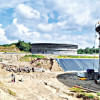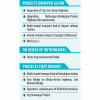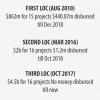Bureaucrats to blame for cost, time overruns

Civil servants' clerical attitude, inertia, and red tape are the key weaknesses in managing the economy, said immediate past planning minister MA Mannan.
The 78-year-old said, "We have the technology for faster progress. But the negative side of bureaucracy is that public servants do not usually respond quickly when it comes to implementation."
The bureaucrat for 29 years retired in 2003 as the chairman of Bangladesh Small and Cottage Industries Corporation. He joined the Awami League in 2005.
Mannan was supposed to join the bureaucracy in 1971 but he did not as the Liberation War broke out. He eventually joined after Bangabandhu Sheikh Mujibur Rahman asked him to in July 1974.
The Daily Star interviewed Mannan, now an MP from Sunamganj-3, over the phone on Saturday. He spoke about faulty project designs, unnecessary public expenditure, slow project implementation, lack of accountability of project directors and engineers, the future role of the finance ministry, the rise of businessmen in parliament, and his regrets and failures.
He said, "Every single bureaucratic tier thinks of themselves as independents, or want to do their work independently. This is a weak link in management and this is the reason why work gets delayed."
Mannan, now the chairman of the standing committee on planning ministry, said, "The finance ministry can allocate money directly to the directorates. Directorates are the main implementation authority…. Instead, the finance ministry first allocates the money to the ministry concerned and then the ministry allocates it to the directorate concerned and then the directorate gives it to project directors, who spend the money."
He suggested dissolving the bureaucratic tiers between the top and the implementation authority for quick implementation of projects.
"As soon as the budget is passed, the entire money is approved by parliament. But in reality, after the budget is passed, it is sent to the finance ministry then the ministry publishes the budget book and everyone waits for the printed book to start work. This takes time. We think that if it is not a hard copy, we cannot start our work."
The book can be sent electronically and it takes just a click, he said, adding that the notion that work cannot proceed without the printed book is unacceptable.
Mannan said bureaucrats and ministers should work as a team. "There are bureaucrats behind ministers. Secretaries, joint secretaries, the Prime Minister's Office, the finance secretary, the governor of Bangladesh Bank, the chairman of the Securities and Exchange Commissions are all wise people and we should hear them out. If we hear them out, they will give their best. If we stay away from them, they will stay away from us. This exists in our culture and we need to get out of this. We must team together," the former minister opined.
Mannan, who first became an MP in 2008, said, "We have no trust in each other. This is the weakness in the management and the reason for delays in work."
He slammed engineers and project directors.
"The strange thing is that after a project is passed, they [project officials] come for revisions and demand an increase in the budget. They say things like the project requires two more bridges and four more culverts. 'Why did you not plan for the two bridges and four culverts when you conducted the survey and prepared the project? This is because you did not go to the project site or you had the site visit done by a third party.' This is inherent in our system," he said.
A big problem is that the project directors do not stay at project sites, said Mannan, who was the minister for planning for five years and the state minister for planning for five years.
"I shouted and yelled about it several times and even the honourable prime minister instructed them to stay at the project sites. But we could not make it happen."
He said, "We are in a growing economy. Our growth is increasing. We have some inflation. If the annual growth is seven percent and the inflation is five or six percent, it is tolerable. But if inflation gets to eight to nine percent, it is not tolerable."
When asked about regrets regarding his stint as a minister, Mannan said he had some regrets but termed his tenure fruitful overall.
"I must say I was not willing to approve some projects. I disagreed with some expenses and these sometimes bothered me. I thought, 'Why should we spend this money now? Can we not do some of these projects later?'"
Mannan defended the prime minister saying the PM knows more than him and that she has to strike a balance between all and thus some projects were approved. "I carried out her orders diligently."
"I will say I enjoyed working with her and the 10 years of work experience with the prime minister was the best experience of my life. As a team leader, the prime minister never questioned me about why I have done something a certain way, or why I did not do something. She trusted me. Whenever there was any doubt and I felt it should be brought to her notice, I asked for her time and she gave me good advice. She presided over every Ecnec meeting. She used to come in at 9:00am and leave at 3:00pm. She used to discuss with us, eat with us, and talk informally," Mannan said.
Asked about the growing number of businessmen in parliament, Mannan said he did not see anything wrong with it.
"Seventy or eighty years ago, most of the parliamentarians were lawyers and barristers. Before that, feudal lords and bahadurs participated prominently in parliament. I do not find any problem with businessmen becoming lawmakers. Most of them are highly educated. Former police officials, bureaucrats, doctors and other professionals are going to parliament now. People from villages are becoming MPs. A completely rural person like me became MP four times. I don't find any problem with this," said Mannan who now resides in his Dungria village of Shantiganj upazila in Sunamganj.
About the country's current economic situation, Mannan said that the country's economy has gone through a bad time.
Technically it is not a recession, he said, adding that the economy was recovering as paddy had bumper harvests and remittance and export bounced back.
"Our economy is growing now."
Asked if he had any advice for his successor at the planning ministry, Mannan replied in the negative and said both were very wise people and that they were doing well.
Mannan concluded by saying he feels proud to be a Bangalee. "We have achieved many things after our country was liberated. There has been a development spree over the last 15 years and Prime Minister Sheikh Hasina handled everything well.
"We need to move forward with democracy, not through the military, or pseudo-martial governance systems. If we have any lacking, we need to practice democracy even more. There is no alternative to it."

 For all latest news, follow The Daily Star's Google News channel.
For all latest news, follow The Daily Star's Google News channel. 








Comments